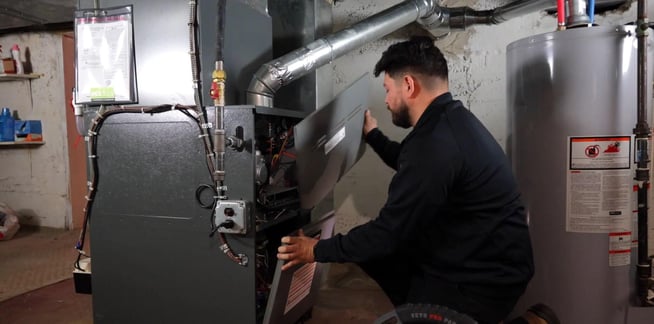Selecting the appropriate size heating system for your home is an important decision that can significantly impact your comfort and energy efficiency. A system that is too small may struggle to keep your home warm, while an oversized system can lead to unnecessary energy consumption and increased utility bills. In this blog, we'll explore the key factors to consider when purchasing a heating system and how to ensure it is the right size for your specific needs.

Assessing Your Home's Heating Load
The first step in choosing the right size heating system is to determine your home's heating load. The heating load is the amount of heat energy your home requires to maintain a comfortable temperature during the coldest days of the year. Several factors contribute to the heating load:
- Square footage: Measure the square footage of each room in your home and consider the ceiling height. This information will help calculate the total volume that needs to be heated.
- Insulation: Assess the level of insulation in your home, as well as the quality of doors and windows. Well-insulated homes require less heating power.
- Climate: Consider the local climate and the coldest temperatures your region experiences. Heating requirements will be higher in colder climates.
- Orientation: The direction your home faces can affect heat gain or loss. South-facing homes may receive more sunlight, reducing the heating load.
Understanding Heating System Capacity
Heating systems are typically measured in British Thermal Units (BTUs) or kilowatts. To ensure optimal performance, your heating system should have the capacity to meet the calculated heating load. However, it's essential not to oversize the system, as this can lead to inefficiency and increased energy costs.
A common rule of thumb is to estimate the heating capacity by multiplying the square footage by 20 BTUs for moderate climates or 35 BTUs for colder climates.
However, for a more accurate assessment, it's best to consult with a heating professional who can perform the calculation for you. This takes into account various factors to determine the exact heating load for your home.
Considering Energy Efficiency
In addition to sizing, energy efficiency is a crucial consideration when choosing a heating system. Look for systems with high Annual Fuel Utilization Efficiency (AFUE) ratings for furnaces or Heating Seasonal Performance Factor (HSPF) for heat pumps. Energy-efficient systems not only save on utility bills but also contribute to a greener environment.

Types of Heating Systems
Different types of heating systems are available including furnaces, boilers, heat pumps, and radiant heating. Each has its advantages and may be better suited to specific homes or climates. Consider factors like fuel availability, installation costs, and long-term maintenance when making your decision.
Investing time and effort into selecting the right size heating system for your home is a wise decision that pays off in long-term comfort and energy savings. By understanding your home's heating load, consulting with professionals, and considering energy efficiency, you can make an informed choice that ensures a warm and cozy home during the coldest months of the year.
If you live in the Delaware Valley/Greater Philadelphia area and would like to find comfort within your home, visit our website or give us a call at 215 - 245 - 3200 to learn more.





